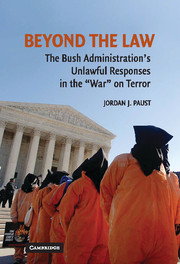Book contents
- Frontmatter
- Contents
- Preface
- Acknowledgments and Permissions
- ONE Executive Plans and Authorizations to Violate International Law Concerning Treatment and Interrogation of Detainees
- TWO Additional Revelations Concerning Treatment, Secret Detentions, and Secret Renditions
- THREE War and Enemy Status
- FOUR Judicial Power to Determine the Status and Rights of Persons Detained Without Trial
- FIVE Executive Claims to Unchecked Power
- SIX Antiterrorism Military Commissions
- Notes
- Name Index
- Subject Index
TWO - Additional Revelations Concerning Treatment, Secret Detentions, and Secret Renditions
Published online by Cambridge University Press: 24 November 2009
- Frontmatter
- Contents
- Preface
- Acknowledgments and Permissions
- ONE Executive Plans and Authorizations to Violate International Law Concerning Treatment and Interrogation of Detainees
- TWO Additional Revelations Concerning Treatment, Secret Detentions, and Secret Renditions
- THREE War and Enemy Status
- FOUR Judicial Power to Determine the Status and Rights of Persons Detained Without Trial
- FIVE Executive Claims to Unchecked Power
- SIX Antiterrorism Military Commissions
- Notes
- Name Index
- Subject Index
Summary
INTRODUCTION
As noted in Chapter One, whether or not they constitute “torture” or “violence to life and person,” it is quite clear that what we saw in photos from Abu Ghraib, for example, the stripping of persons naked and hooding for interrogation purposes and the use of dogs for interrogation and even terroristic purposes, are among patently illegal interrogation tactics and treatment of detainees of any status covered by various treaty-based and customary international legal prohibitions of cruel, inhuman, degrading, and humiliating treatment, physical coercion, threats of violence, measures of intimidation, and terrorism during any armed conflict and regardless of purpose or feigned excuses on the basis of reciprocity, reprisals, or alleged necessity. As noted also in Chapter One, President Bush, various members of his administration, and others within the Executive branch authorized, abetted, and/or tolerated these and other violations of international law. Moreover, these and other violations have not been ruled out by the administration, even after passage of the 2005 Detainee Treatment Act pressed by Senator McCain. The Bush administration has claimed a radical commander in chief power to violate any inhibiting international law and congressional legislation during an alleged “war” on “terrorism” that has lasted longer than World War II and that Congress has not declared or formally authorized and seems unending.
- Type
- Chapter
- Information
- Beyond the LawThe Bush Administration's Unlawful Responses in the "War" on Terror, pp. 25 - 46Publisher: Cambridge University PressPrint publication year: 2007



